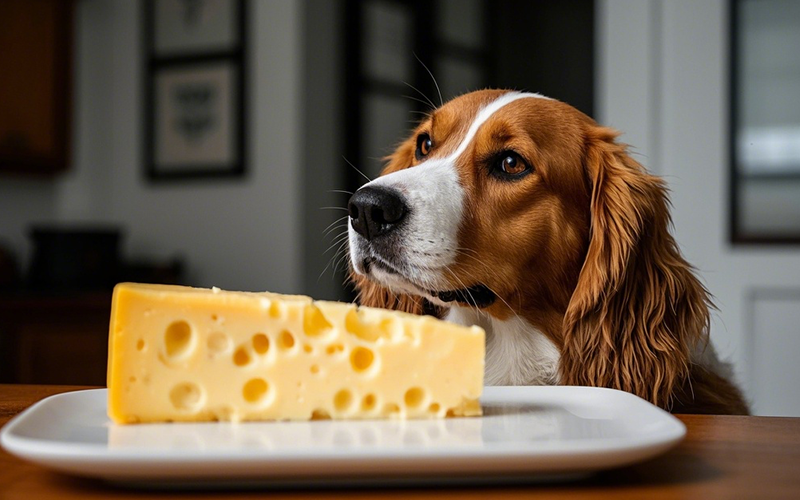Can Dogs Eat Cheddar Cheese? Here’s What You Should Know
- 25 Mar 2025 10:57
Cheddar cheese is a delicious treat for many people, but when it comes to sharing it with your dog, there are a few things to consider. While cheese is not inherently harmful to dogs, it’s important to understand the pros and cons before offering it as a snack.

The Benefits of Cheddar Cheese for Dogs
Good Source of Protein
Cheddar cheese is a good source of protein, which is important for maintaining your dog’s muscle mass and overall health. Protein also helps with tissue repair and supports a healthy immune system. 🦴💪Rich in Calcium
Cheddar cheese is rich in calcium, which is vital for strong bones and teeth. Regular intake of calcium can help keep your dog’s bones healthy, especially in growing puppies or senior dogs. 🦷Source of Vitamins
Cheddar cheese contains vitamin A and vitamin B12, both of which play an important role in maintaining your dog’s vision, immune function, and overall well-being. 🌟
The Risks of Cheddar Cheese for Dogs
Despite the nutritional benefits, there are some risks associated with feeding your dog cheddar cheese:
High in Fat
Cheddar cheese is relatively high in fat and calories, which can contribute to obesity if given in large amounts. Overweight dogs are at risk for a variety of health issues, including joint problems, heart disease, and diabetes. It’s important to serve cheese in moderation to avoid excessive calorie intake. 🧀⚖️Lactose Intolerance
Many dogs are lactose intolerant, meaning they have difficulty digesting the lactose (a sugar found in milk and dairy products) in cheese. If your dog is lactose intolerant, feeding them cheese can lead to gastrointestinal upset, such as gas, bloating, diarrhea, or vomiting. If your dog has never had cheese before, start with a small amount and observe them for any signs of discomfort. 🐾💩Salt Content
Cheddar cheese can be quite salty, and excess sodium can be harmful to dogs. High sodium levels can lead to dehydration, increased thirst, and in severe cases, salt poisoning, which can cause symptoms like vomiting, diarrhea, and tremors. It’s best to limit how much cheddar cheese you give to your dog, especially if they have other health concerns. 🧂
How to Safely Serve Cheddar Cheese to Your Dog
If you decide to feed your dog cheddar cheese, here are some tips to ensure it’s done safely:
Serve in Moderation
Cheddar cheese should only be given as an occasional treat, not a regular part of your dog’s diet. A small cube or a little shredded cheese is enough to enjoy the nutritional benefits without overloading on calories or fat.Check for Lactose Sensitivity
Start by offering a tiny piece of cheddar cheese and see how your dog reacts. If they show any signs of upset stomach (such as gas, bloating, or diarrhea), it may be best to avoid cheese in the future.Avoid Processed Cheeses
Processed cheeses, like cheese slices or cheese spreads, often contain additional preservatives, artificial flavorings, and unhealthy additives that are not suitable for dogs. Stick to plain cheddar and avoid any cheese that has been heavily processed or contains unnecessary ingredients.Consider Low-Fat Options
If you want to reduce the calorie intake, you can look for low-fat cheddar cheese or opt for other cheese varieties that are lower in fat. However, even low-fat cheese should still be given in moderation.
What to Do If Your Dog Eats Too Much Cheese
If your dog eats too much cheddar cheese, especially if they’re not used to dairy products, you might notice symptoms of digestive upset, such as:
Gas 💨
Diarrhea 💩
Bloating 🐾
Vomiting 🤢
If your dog shows any of these symptoms, it’s best to avoid feeding them more cheese and keep an eye on them. If the symptoms persist or worsen, consult a pet health professional for guidance. You can also reach out to PettureX for a 24-hour online consultation to get expert advice. 📱
The Bottom Line: Can Dogs Eat Cheddar Cheese?
Yes, cheddar cheese is generally safe for dogs to eat in small amounts, provided your dog doesn’t have any issues with lactose intolerance or excessive sodium. Cheddar cheese can provide your dog with beneficial protein, calcium, and vitamins, but it should only be offered as an occasional treat.
As always, moderation is key, and it’s essential to monitor your dog’s response to cheese. If your dog experiences any digestive issues or shows signs of discomfort, it’s best to limit or eliminate cheese from their diet.
For expert guidance and to ensure your dog stays happy and healthy, consider using PettureX, a pet health assistant offering 24-hour online consultations for all your pet-related questions! 🌟
Related

Crunchy Curiosity: Can Dogs Safely Snack on Pork Rinds? A Deep Dive
- 21 Apr 2025
Pomegranate Seeds and Pooches: A Deep Dive into Whether Dogs Can Safely Indulge
- 21 Apr 2025
Can Dogs Eat Peaches? Vet Explains Benefits, Cyanide Risks & Safe Serving
- 16 Apr 2025
Can Dogs Eat Mulberries? Vet Explains Safety, Benefits & Potential Risks
- 16 Apr 2025
Can Dogs Eat Mozzarella? Vet Explains the Cheesy Truth (Risks & Benefits)
- 16 Apr 2025
Can Dogs Eat Mango Skin? Vet Explains Why It's a Risky Chew!
- 16 Apr 2025
Can Dogs Eat Maple Syrup? The Sugary Truth & Why Vets Advise Against It
- 16 Apr 2025
Can Dogs Eat Mac n Cheese? Vet Explains Why This Comfort Food Is Unsafe!
- 16 Apr 2025
Can Dogs Eat Liver? Vet Guide to This Nutrient-Dense Organ Meat (Benefits & Risks!)
- 16 Apr 2025
Can Dogs Eat Lamb? Vet Insights on This Nutritious Meat Option
- 16 Apr 2025
